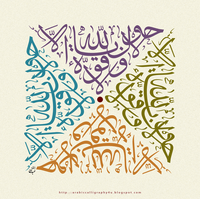
The Ḥawqala (Arabic: حَوْقَلَة) or the La Hawla (Arabic: لَا حَوْلَ) is an Arabic term referring to the Arabic statement لَا حَوْلَ وَلَا قُوَّةَ إِلَّا بِٱللَّٰهِ (lā ḥawla wa-lā quwwata ʾillā bi-llāhi), which is usually translated as "There is no power nor strength except by God."
This expression is used by Muslims when seized by a calamity or in a situation beyond their control, usually when being oppressed or forcefully put through suffering. An equivalent English expression would be "oh my God". The word Ḥawqala is a portmanteau (or naḥt) of the words ḥawla and quwwata.[1]
A longer version is لَا حَوْلَ وَلَا قُوَّةَ إِلَّا بِٱللَّٰهِ ٱلْعَلِيِّ ٱلْعَظِيمِ (lā ḥawla wa-lā quwwata ʾillā bi-llāhi l-ʿaliyyi l-ʿaẓīmi), meaning "There is no power nor strength except by Allah the Lofty, the Great".
See also
[edit]References
[edit]External links
[edit]
Well, that’s interesting to know that Psilotum nudum are known as whisk ferns. Psilotum nudum is the commoner species of the two. While the P. flaccidum is a rare species and is found in the tropical islands. Both the species are usually epiphytic in habit and grow upon tree ferns. These species may also be terrestrial and grow in humus or in the crevices of the rocks.
View the detailed Guide of Psilotum nudum: Detailed Study Of Psilotum Nudum (Whisk Fern), Classification, Anatomy, Reproduction